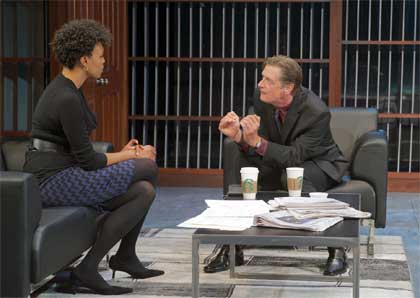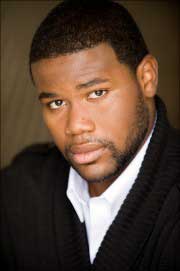Play (2009)
by David Mamet
Directed by Robert Walsh
New Repertory Theatre
Watertown, MA
October 14 – November 4, 2012
With Ken Cheeseman (Jack Lawson), Miranda Craigwell (Susan), Johnnie McQuarley (Henry Brown), Patrick Shea (Charles Strickland)

Photo by Andrew Brilliant/ Brilliant Pictures
Jack Lawson (Ken Cheeseman) and Henry Brown (Johnnie McQuarley) are lawyers who are approached by Charles Strickland (Patrick Shea) regarding a high-profile rape case. Strickland claims he is innocent. Lawson and Brown, thinking purely pragmatically, are hard put to figure out a possible defense. A younger and more idealistic associate in the firm, Susan (Miranda Craigwell), gets involved in the machinations and all legal hell breaks loose.
In a statement from 2009 printed in the program, David Mamet writes: “President Obama, like his predecessor President Bill Clinton, has suggested that this country engage in a dialogue about race… My current play, Race, is intended to be an addition to that dialogue.”
I particularly admire several of Mamet’s brash earlier plays, notably American Buffalo and Glengarry Glen Ross. They are coarse and brusque, but there is an intricacy of plot design, a good supply of colorful characters, a careful portrayal of manipulative thought and behavior, and an abundance of lines (peppered with four letter words) shaped by a musical ear.
In Race, as in Boston Marriage, which the New Rep produced two years ago, there remains an intricacy in plot and an interest in manipulative behavior. That Mamet wants to enter the race discussion with this play is entirely admirable. But, in Race, as in Boston Marriage, that intricate depiction of manipulation, though engaging, feels somewhat less pungently focused than in those earlier plays.
In this play, Jack Lawson, one of the law partners, is white, and Henry Brown, the other law partner, is black. Susan, the younger associate, also is black. The portrayal of the relationship between the characters and the way that pragmatism, idealism and manipulation operate is interesting indeed.
But, in the end, how the dramatic fulcrum gets focused seems forced. When push comes to shove, would any lawyer in a firm like this one act in the depicted way? A more subtly drawn dramatic development would have been more believable and more effective.

One of the great dramatic turns of the evening came from the staffing of the cast: Johnnie McQuarley had to step in at the last minute for Cliff Odle in the role of Henry Brown. He did a wonderful job, despite a short amount of rehearsal time in the role, and it was clear from the cast’s appreciation at the end that they were pleased.
Mamet’s dialogue is frequently made up of sentence fragments that transition from character to character in rapid rhythmic sequences. It was clear from the performance – particularly early on – that the cast was adjusting to this new member and that the transitions were a bit less snappy than they might be. But, McQuarley did a darn good job, as did they all, and, as the performance went on, the seams entirely disappeared and the company delivered a most satisfying performance. Clearly, Robert Walsh, who at the New Rep delivered a wonderful performance in last season’s production of Yazmina Reza’s Art and directed Mamet’s Speed The Plow a few seasons ago, provided supportive and capable directing here.
– BADMan
Leave a Reply